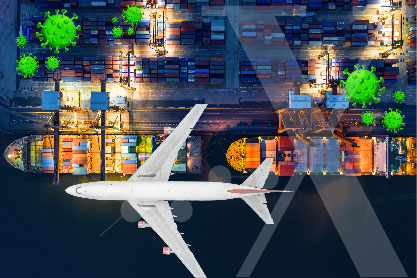 Wuhan, China, the presumed epicenter of COVID-19, was barely a blip on most people's radar before the virus breakout.
Wuhan, China, the presumed epicenter of COVID-19, was barely a blip on most people's radar before the virus breakout.
It wasn't until much later did we begin learning just how important a global manufacturing hub Wuhan is. For decades it's been a pivotal area of modern industrial manufacturing for high technology and engineering industries including: 20 companies in the electronic communications industry, 11 in pharmaceuticals, and four in automotive.
Drawing emphasis to the importance of Wuhan, over 200 of the Fortune Global 500 firms have a presence directly in Wuhan, supported by a host of tier 1 and 2 suppliers.
Not easy to picture this modern technology manufacturing hub in the same context with the seafood market known to illegally trade wild animals - where the outbreak originated.
The tenants behind outsourcing manufacturing are simple: It helps businesses become more competitive in the global marketplace, allowing expansion into these markets while keeping labor costs low. This has been done largely by hiring workers in emerging third world countries with lower standards of living. And a significant benefit in doing this, it lowers prices on the goods they produce then ship back to sell in US markets. But often, this comes with a few trade-offs; lack of control, communication hurdles, inconsistent quality assurance - and of course, increased unemployment for US workers.
THE REAL COST OF CHEAP LABOR
Since the early 90's, the lure of cheap labor, and fewer regulatory restrictions have attracted businesses to countries in Asia and Africa like moths to a flame. Unfortunately, this is also where most all recent, large scale disease outbreaks have originated from:
- SARS-CoV - Cases of Severe Acute Respiratory Syndrome, or SARS, first emerged in 2002 in China
- MERS-CoV - The Middle East Respiratory Syndrome Coronavirus first emerged in Saudi Arabia in 2012
- Avian influenza A(H7N9) began spreading from poultry to humans in China in 2013
- Ebola emerged in 2014, spreading across Guinea, Liberia, and Sierra Leone
- Our current 2019-CoV (COVID-19) is believed to have emerged from a seafood market in Wuhan, China.
Unparalleled shifts in human population is the main driver behind these disease outbreaks. These rapid bursts of urbanization creates ruinous ripple effects upon these emerging cities: More urbanization means more deforestation, and the loss of wildlife habitat and predators. When predator numbers diminish, rodent populations explode - as do the transferable diseases they carry with them. And as we're witnessing with COVID-19, these zoonotic diseases spread rapidly and can too easily become worldwide threats.

COVID-19 DISRUPTIONS IN ELECTRICAL & LIGHTING MANUFACTURERS' GLOBAL SUPPLY CHAINS
Amongst the many resources on the Connexion COVID-19 resource page, you'll find an alphabetical listing of all the communications we received from our manufacturers since the beginning of the pandemic. At the top of this list is updated information of manufacturers' factory shut-downs. This information will be valuable if considering fast-tracking any projects using these manufacturer's products. To quickly access this information, Look for the image depicted here on the right.
OFFSHORINNG IMBALANCES, AND TARIFFS ON CRITICAL SUPPLIES
A key finding in a recent Thomas survey shows that over half of manufacturers are ‘likely to extremely likely’ to bring production and sourcing back to North America. Additionally, 47% of U.S manufacturers report they are now seeking domestic sources of supply. We have become so reliant on off-shoring our manufacturing for all manner of products, that now we're experiencing the ramifications of these decisions. Aside from imports of essential medical devices being a serious threat to our public health and security, the shortages we're now experiencing have also invited rampant counterfeiting and price gouging.
Since 2018, there's been some shifting, near-shoring and reshoring in the global manufacturing landscape due to our ongoing trade war with China, The lesson that businesses should have learned from the US-China trade war is that constructive dialogue between nations often takes a back seat to politics and sabre rattling. As the COVID-19 pandemic escalates, the risks inherent in global supply chains are indisputable:
- China manufactures 80 percent of all medical face masks - but as their own domestic outbreak worsened, China’s government enforced restrictions on face mask exports.
- Malaysia, manufactures over half the global supply of medical gloves and understandably meets the needs of their own citizens first before fulfilling export demands.
Exacerbating this situation, the Trump Administration's tariffs on Chinese medical products is contributing to shortages and higher costs of the vital supplies we need at a time of crisis. As long as nations choose to weaponize global trade, we cannot afford such imbalances in offshoring. Will COVID-19 be the catalyst for a smart reshoring movement?
IS AI A KEY FOR RESHORING US MANUFACTURING?
There actually has been a trend of manufacturing jobs coming back to the states with the majority of these coming from China. This in no small part is due to for the past 15 years, labor costs in China has risen 12 to 15 percent year over year. While some of these reshored jobs are being performed by robotics, when implemented in an intelligent manner, they're actually helping bring more jobs back from overseas than they’re eliminating. I'm not suggesting that Artificial Intelligence will not eliminate some jobs - But they should create new jobs in areas that we may or may not yet know of.
As many successful reshored operations have discovered: moving manufacturing closer to engineering; promotes easier design improvements, waste reduction, quality improvement, and an increase in productivity. Often the result is speed to market with a superior product at a lower overall cost. In most any market or industry, the company that's the most nimble usually puts itself in a position to take market share.
The impact of COVID-19 on supply chains has been substantial, yet its total impact is still unknown. From raw materials to finished goods, COVID-19's global economic and financial ramifications will certainly be felt for years to come. There is certainly incentive and precedence for businesses to seriously consider reshoring - or at the least, diversifying their supply chains to mitigate risks from any single region (vis-à-vis Wuhan, China).